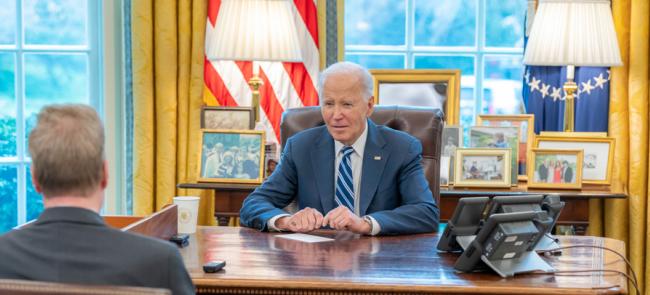
A Conversation with Sen. Jeanne Shaheen
Sen. Jeanne Shaheen, D-N.H., never served in the National Guard, but she does have some meaningful history with the organization.
Shaheen was governor of New Hampshire and commander in chief of the New Hampshire Guard from 1997 to 2003. She oversaw Granite State units in the aftermath of the Sept. 11, 2001, terrorist attacks, when demands on the force, both at home and overseas, dramatically increased.
Today, Shaheen can impact the Guard across all 50 states, three territories and the District of Columbia. She is a member of the Senate Appropriations, Armed Services and Foreign Relations committees.
And last year she succeeded Sen. Patrick Leahy, D-Vt., as co-chair of the Senate National Guard Caucus. Leahy, who retired at the end on 2022, held the post for more than two decades.
Shaheen sat down with NATIONAL GUARD recently to talk about her time as governor and the issues facing the Guard today.
You were governor of New Hampshire from 1997 to 2003, which gives you some unique perspective on the National Guard. How does serving as commander in chief of the New Hampshire Guard influence how you approach the Guard today?
It does. It certainly gave me a greater appreciation, I think, for the role that the Guard plays. One of the first people that I met after I was elected was our adjutant general at that time —Major General John Blair. The Guard was responsible for doing the inauguration ceremony for the governor of New Hampshire. And so, I can remember very clearly in our meeting, the general coming in and saying something like, “You know, I’ve never done this before.” I said, “You know, I’ve never done this before either, General Blair.” We had a wonderful working relationship.
And not only did they do all of the things that we hear about the Guard in terms of coming in for disasters and emergencies, after 9/11 they also handled airport security when we finally reopened up all the commercial. I can remember being in the airport the day the Guard came in. Everybody in the airport started clapping when the Guard members came in.
I had something called the Kids Cabinet, where we brought together all of the agencies that dealt with kids. And General Blair assigned a staff person from the Guard to be the administrating chief of staff for that effort in New Hampshire.
So, we had a very close working relationship, and I saw the whole range of things that they do, not only to address security, but domestically as well.
The Department of the Air Force has a legislative proposal right now that has an impact on governors across the country if it were to happen. The service would be allowed to move the Air Guard’s space units to the Space Force without the consent of those state governors. This consent has been a requirement in federal law for about 120 years. As a former governor, what’s your perspective on this proposal, and how do you feel about the idea of creating a Space National Guard instead?
I asked Secretary Kendall [Air Force Secretary Frank Kendall] about it yesterday [April 10 at the Senate Appropriations Committee hearing. His explanation for that was that we have some people who are in between right now — as we’re shifting people into the Space Force — and we need to resolve their circumstances so that they have some certainty about their futures, so Space Force knows what they’re doing, the Guard knows what they’re doing.
I explained there’s real concern that I’m hearing from the Guard in New Hampshire about what this means and whether this means that there will be the ability to change other missions with respect to what the Guard does without consent. And he said, “Absolutely not. This is something we need to do to address this particular segment because of what we’ve done with the Space Force.”
I’m willing to take him at his word and make sure I think that’s a legitimate concern, that we resolve that issue for those people who are affected. We are not going to change the way we deal with the mission of the Guard.
(Editor's Note: Shaheen was one of the 85 lawmaker who signed the May 6 letter to chairmen and ranking members of the House and Senate Armed Services committees opposing the Air Force’s legislative proposal.)
There's a very real connection between the health of our fighting force and the cost of any kind of mission.
What would you like to accomplish this year with the Senate National Guard Caucus as its co-chair?
There are some priorities that the National Guard Caucus has that I hope we can make some progress on.
One is health care. NGAUS has legitimately raised the fact that we have members of the Guard who don’t necessarily have health care coverage because they’re not covered under TRICARE, they’re not covered in the same way that the active duty is covered. And so, we’re trying to work with the association to get better information on how many people are affected, on what the costs of that would be, to see if we can move that forward, because, I think, that’s a very legitimate concern. If we have people working on behalf of this country, of the state of New Hampshire, we want to make sure that their health is good, and that they can get the care that they need. So, that’s one priority.
Recapitalizing the air assets of the Guard is another. Again, I think that’s something that we need to take a look at and see what we can do to support.
You wear many different hats in the Senate, including serving on the Senate Appropriations, Armed Services and Foreign Relations committees. As you look across the country and around the world, what issues concern you the most, especially as it pertains to the Guard?
We’re now in a very different situation then when I first got to the Senate, which was in the immediate post-9/11 era when terrorism and the threat of terrorism was a concern, when we were fighting in Afghanistan and Iraq. Now, we’re in a very different arena with great power competition. We were able to do what we did over the 20 years of the war in Afghanistan and the war in Iraq because we had Guard and Reserve that served with our active-duty service members. That’s going to be a critical issue going forward as well, as we look at our ability to respond to great power competition. We need to make sure that our Guard is able to again, work with active duty to ensure that we can be successful in that mission.
One of the interesting things that happened after 9/11 is that after much discussion, the chief of the National Guard Bureau was added to the Joint Chiefs of Staff in fiscal 2012. How did that empower the Guard, and where do you think the Guard could be further empowered today?
Right. I supported that. I think that was important because, as I said, we were in a period where the Guard was really critical to ensuring that we could perform the national security mission that we have for our military. And I think having the head of the National Guard Bureau at the table when those decisions are being made is really important because we’re affecting members of the Guard who, in a lot of cases, are in a different situation than the active duty because they haven’t made this a full-time commitment, yet they have the potential to be deployed for a given mission. They leave their jobs, they leave their families, just as active-duty members do. But oftentimes, it has different impacts on them because they’re not doing this full-time.
And so, it is important to have somebody at the table who can speak for the needs of our National Guard.
In the fiscal 2022 National Defense Authorization Act, there was a provision that gave National Guardsmen and reservists the same special- and incentive pay that active component members received for achieving the same level of proficiency. That language said that the Defense Department had until Sept. 30, 2022, to provide Congress with an implementation plan. It has been more than 18 months, and that plan hasn’t been provided; why isn’t the Pentagon following that law?
Yes, I agree the Guard Bureau owes us a plan. I understand that the requirements were modified slightly to provide more flexibility to the Department of Defense; however, Congress still awaits a full report on the matter.
There has been a real change in attracting and retaining military talent in recent years. What do you think might fix some of the struggles the Guard and the other military services have been having with recruiting and retention lately?
I think it is an ongoing challenge. And, unfortunately, it is not limited to the National Guard or even the military. The Marines are actually the only ones who aren’t having a recruitment problem.
It is something that I hear every time I go to a business in New Hampshire — they have workforce issues. The demographics in our country are such that workforce is a challenge, and it is a challenge whether we’re talking about the National Guard, the Navy, the Army or BAE Systems in New Hampshire. It is a challenge, and it is a long-term issue that we’ve got to think about how we respond to. It is an issue, and it is an issue that we have to address.
We had this conversation today [April 11] — I’m thinking the session with General [Christopher G.] Cavoli [the commander of U.S. European Command and the Supreme Allied Commander Europe] was talking about the Russian ability as we’re seeing in Ukraine to continue to just send waves of people in to fight and that we have to think about that going forward as we’re thinking about the recruitment challenges and the size of the force.
How do you balance the idea of zero-cost TRICARE for Guardsmen and reservists with being fiscally prudent and getting a good return on investment?
First of all, that’s why I said what we need is the data on how many people are affected and what their circumstances are. We don’t know that. We have some estimates, but we don’t have anything that really has foundational data to help us as we’re thinking about, how do we address this going forward and what is the cost of that? Does it make sense to enroll people in TRICARE? Does it make sense to enroll people in the Affordable Care Act? We just don’t know the answer to that, because we don’t know how many people are affected, what states they’re in. And when we get that, then we can better determine going forward what makes the most sense.
But I would argue that it is in everybody’s interest to have people who are in the Guard who are healthy, who don’t have to worry about whether they can get the checkups that they need, whether they have issues. Long-term, that really undermines the Guard an our military.
If you look at World War II, one of the things that defeated [German Gen. Erwin] Rommel in Africa was the fact that they did a terrible job putting in place sewage and privies. You may know this but they had a lot of their soldiers who were affected by dysentery. And that was one of the things that allowed us to defeat him.
So, there’s a very real connection between the health of our fighting force and the cost of any kind of a mission.
AT A GLANCE: Sen. Jeanne Shaheen
BORN: Cynthia Jeanne Bowers, Jan. 28, 1947 (St. Charles, Mo.)
MARITAL STATUS: Married to Bill Shaheen, three children, seven grandchildren
EDUCATION: Shippensburg University, Shippensburg, Pa., B.A. English, 1969; University of Mississippi, Oxford, Miss., MA Political Science, 1973
PROFESSIONAL OVERVIEW: U.S. Senate, 2009-present; Director, Harvard Institute of Politics, Cambridge, Mass.; New Hampshire Governor, 1997-2003; New Hampshire State Senate 1990-1996; small-business owner; teacher
COMMITTEE ASSIGNMENTS: Appropriations Committee, Armed Services Committee, Foreign Relations Committee, Small Business and Entrepreneurship Committee and Select Committee on Ethics
ALSO NOTABLE: First woman elected both a governor and a U.S. senator. Succeeded Sen. Patrick Leahy, D-Vt., in 2023 as Democratic co-chair of the Senate National Guard Caucus.
Source: Senate bio



